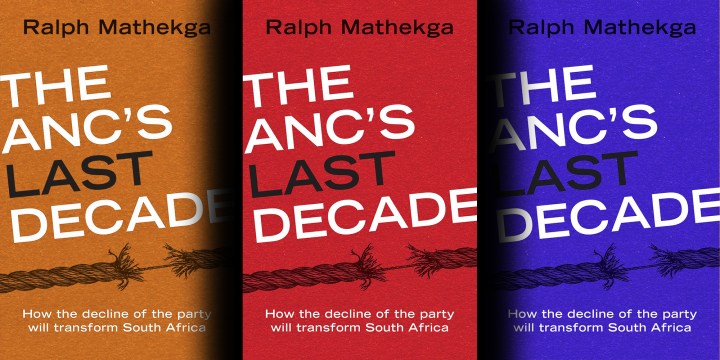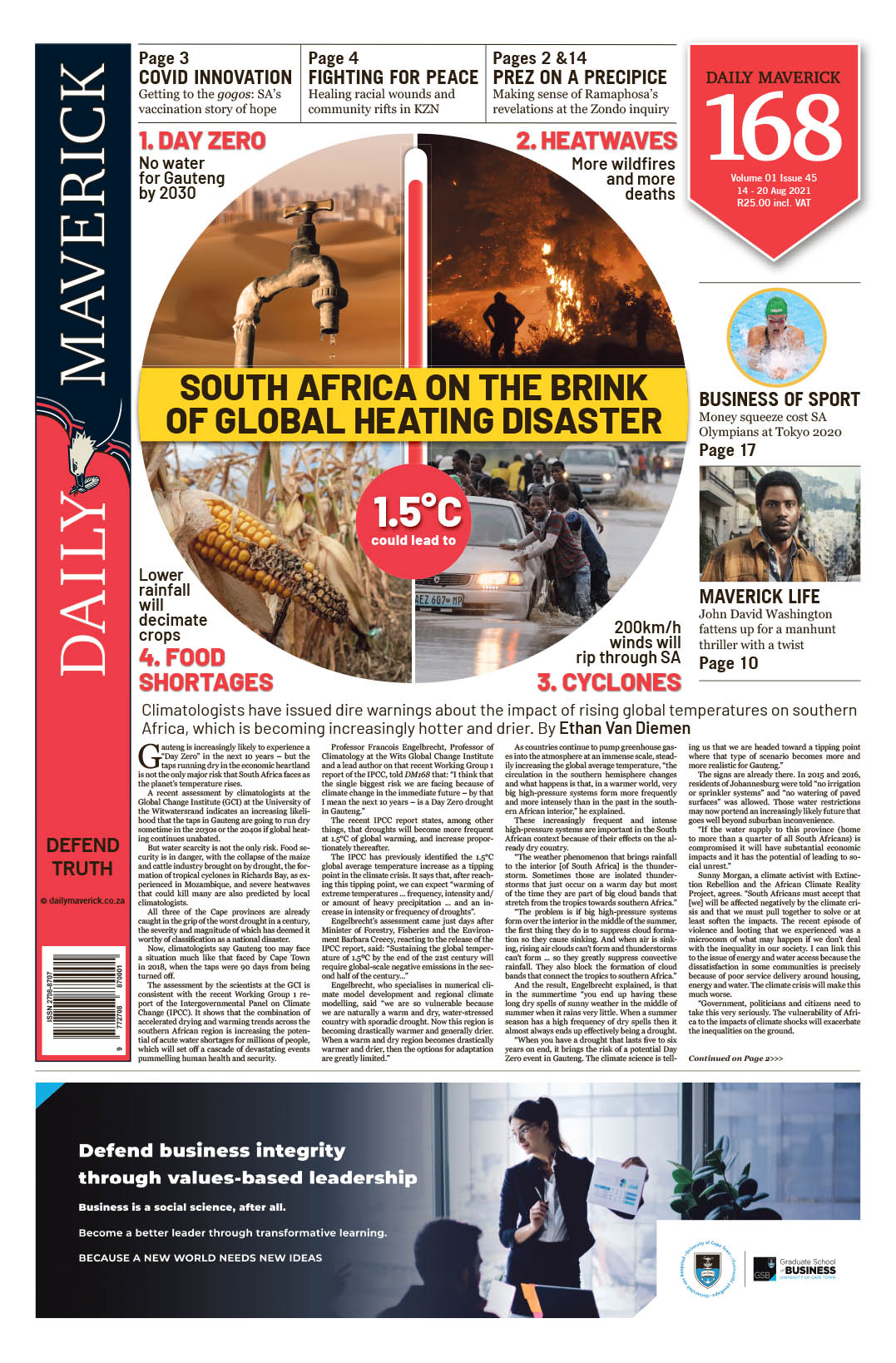DM168 BOOK EXTRACT
The ANC’s battle to secure moral and political victory in South Africa

In an extract from his book, ‘The ANC’s Last Decade’, Ralph Mathekga reflects on a future where the ANC, seemingly at war with itself, no longer holds absolute power and will fall below the 50% threshold before the end of the decade.
First published in the Daily Maverick 168 weekly newspaper.
The next elective conference of the ANC (in December 2022) will, in part, be a referendum on what kind of party it wants to be – a party of corruption busters or a party of rent-seekers. When it comes to the moral battle, Ramaphosa is already a winner, even if he should be politically defeated. He wants both a moral and a political victory, while his detractors are looking for one thing and one thing only: a political victory in the form of Ramaphosa’s removal. A political victory without a moral victory, however, would spell trouble at the ballot box.
If the ANC needed Ramaphosa to survive the 2019 provincial and national elections, the party would certainly need someone like him to survive the 2024 elections.
The moral dimension at play here works in Ramaphosa’s favour. What Ramaphosa ought to emphasise at the next elective conference is the danger of any political decision that lacks a moral basis.
By turning up the heat on corruption in state institutions, Ramaphosa is setting the ANC on an irreversible course of confronting the ills that have been accumulated in the party and the state over the past decade.
This renders certain people unelectable unless the party is set on the imminent loss of power. The next elective conference would have to pronounce, clearly, the direction the party will take regarding anti-corruption measures. Other issues are peripheral.
If Ramaphosa intensifies his anti-corruption campaign in state institutions – and succeeds – the ANC will have a tough time rejecting him. Ramaphosa’s leadership has pushed the party into a corner, where it is faced with a choice.
Despite criticism in the party about the impact of his war on corruption, Ramaphosa has not relented. Institutions that are part of the state’s anti-corruption apparatus have been strengthened. In his State of the Nation Address in February 2021, Ramaphosa announced the establishment of a new independent statutory anti-corruption body. Ramaphosa’s former Minister of Finance, Tito Mboweni, allocated a further R1.8-billion to the Department of Justice and Constitutional Development to “fight against crime and corruption”.
Ramaphosa is clearly staking his political future on this issue ahead of the December 2022 conference. It is also one of the main issues upon which the electorate will judge him. The president does not bring much to the table regarding economic success.
In this area, he has been less adept at finding a way to sidestep the ANC’s influence, even as he has undeniably restored credible leadership at the National Treasury. His rivals, on the other hand, will come to the next elective conference preaching the gospel of economic emancipation. They will likely avoid the question of corruption, except when they retort that Ramaphosa and his allies are manipulating the anti-corruption drive to pursue a political agenda: the purging of progressives in the ANC.
Ramaphosa has thus far decided not to confront his rivals directly on economic issues. He has been more compromising on economic-policy direction, resigning himself to the mild idea of incremental fiscal consolidation. Therefore, the differences in the ANC involving the economy are not as stark as the tensions about the anti-corruption campaign.
Compromises about conflicting economic positions in the ANC can be reached; however, a compromise about the effect of anti-corruption measures on the political fortunes of some senior members of the party is difficult to imagine, given the potential voter fallout if compromised party members do not have to face the music. Nothing ever has hardened relations among ANC members more than Ramaphosa’s anti-corruption agenda.
Ramaphosa was fully aware of the dangers that this agenda posed to his future leadership in the party, but he also realised that compromising about this issue entailed its own risks at the ballot box and in terms of damage to his own reputation. The clampdown on patronage and nepotism has had a direct effect on the pockets of certain members who were part of the rent-seeking faction during the Zuma years. In the end, it is money that lies at the heart of the most vehement internal opposition to Ramaphosa.
Unlike the Nasrec conference, the next elective conference will not offer the ANC the option of choosing the middle ground on the corruption issue.
At Nasrec, Ramaphosa’s victory provided respite for those who believed the party needed a fresh start after the Zuma years. On the other hand, the broader leadership elected at the Nasrec conference, including the NEC and the Top Six, was a concoction that sent out the message that the Zuma dragon, while defeated, had not been slain.
The NEC was chock-full of Zuma loyalists, who are also well represented both in Cabinet and in parliamentary committees. This was not a concern for many after the Nasrec conference, with the presumption that Ramaphosa would eventually wield executive authority to drive his political agenda in government. Zuma’s loyalists would eventually do Ramaphosa’s bidding, the thinking went. Since then, many journalists and commentators have admitted that this reading of the outcome of the Nasrec conference was based more on hope than logic. The Zuma loyalists were able to hold Ramaphosa back, even though he was able to outmanoeuvre them in certain areas.
The Nasrec conference also presented an interesting middle road concerning the composition of the Top Six. Here, Ramaphosa has been flanked by die-hard Zuma allies such as Jessie Duarte and (until his suspension) Ace Magashule. While this raised red flags about the ability of the Top Six to lead the ANC in a difficult moment of realignment, the Top Six also included former Gauteng Premier Paul Mashatile and former Zuma ally Gwede Mantashe. The man in the middle is Deputy President David Mabuza, seen as responsible for orchestrating the results at Nasrec by “betraying” Nkosazana Dlamini-Zuma in her leadership race against Ramaphosa. Had it not been for Mabuza’s complex agenda at Nasrec, Dlamini-Zuma would have won the ANC presidency, putting Zuma allies firmly in power.
This type of divided arrangement that is neither here nor there about the direction of the party will not be possible at the next elective conference of the ANC. The party has run out of runway, and it ought to move only in a clear direction. Voters will view another set of compromises as proof that the ANC has stagnated.
It is worth noting that the Nasrec leadership settlement did not come out of deliberate efforts by interest groups to reach a compromise. It came out of a perceived political betrayal. Disgruntled conference delegates nearly contested the results, little realising that the Nasrec results would end up boosting the party at the ballot box in 2019.
It is unlikely that the warring ANC factions will entertain a compromise in terms of leadership to be elected at the next ANC national conference. Further, a false sense of confidence rules in both factions. One faction believes that merely beating the drum of radical economic transformation will exonerate the party from accountability for the large-scale looting during the State Capture years.
They believe that their crusade against the continued domination of white-owned businesses (the dreaded “White Monopoly Capital”) provides a moral basis upon which they should be allowed to lead, despite their poor record in addressing structural problems in the economy. For this lot, compromise is a no-go area. They believe their victory in the ANC directly translates into electoral victory in the country.
On the other side of the fence stands a faction that believes it can prevail at the elective conference of the ANC despite the uphill task of reforming the party from within. This requires that groundwork is done at party level, the work they prefer not to do. This is the faction that wants to believe that the moral basis to lead, as seen in the eyes of the broader South African population, should also lie with the ANC, without work being done within the party to realign it.
This faction is not known for holding a position in the ANC; it is perpetually in search of a compromise. It is a faction that is not in the business of picking fights on the issues in the ANC. The dominant factions within the ANC declare victory at every turn, because they believe they are in control of the situation.
In this scenario, a political compromise is difficult to imagine, unless the dice fall a certain way, as they did at Nasrec. At the 2022 conference, the party will have to take a clear stance on whether it is an establishment party that pursues its agenda while being part of the system, or whether it is a revolutionary party that adopts an anti-establishment posture and pursues its agenda by challenging the system.
In the last three decades of democracy, the ANC has been able to have it both ways: enjoying an existence as a party that is part of the establishment in which it exercises political power, but at the same time walking away from the establishment by pursuing anti-establishment politics, including openly challenging the judiciary’s legitimacy to make decisions that affect the party’s policy.
In this respect the ANC has blurred the lines between the party and the state, with the party sometimes being used to take an activist anti-establishment position against the judiciary when its judgments reflect negatively on senior party members.
The future of the ANC and the direction of the country until the 2024 elections hinge on the 2022 conference. The message the party sends out will be contained less in the wording of policy documents than in the types of leaders who emerge from the conference.
It can no longer dodge key decisions, such as clarity about the country’s future economic direction and the fight against corruption.
The giant will soon be standing before its Rubicon. DM168
This story first appeared in our weekly Daily Maverick 168 newspaper which is available for R25 at Pick n Pay, Exclusive Books and airport bookstores. For your nearest stockist, please click here.



















 Become an Insider
Become an Insider
Comments - Please login in order to comment.